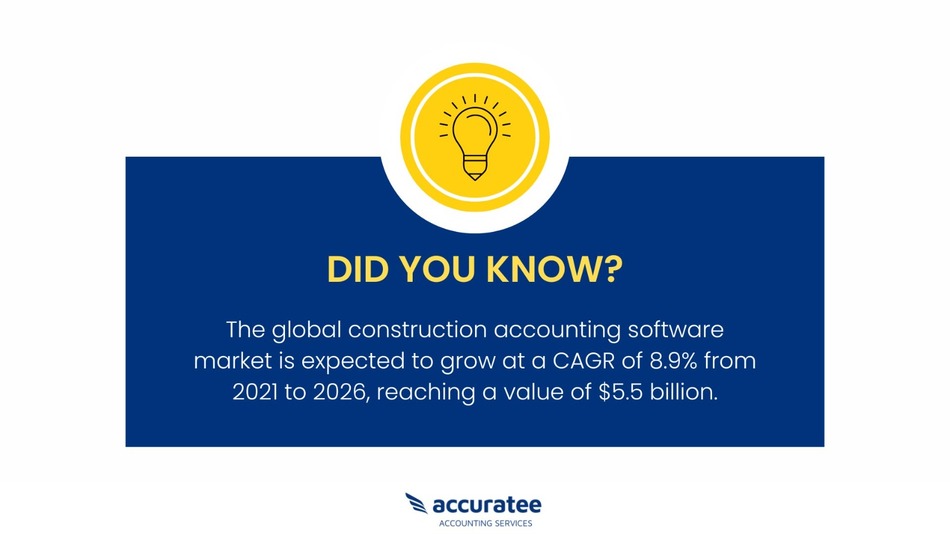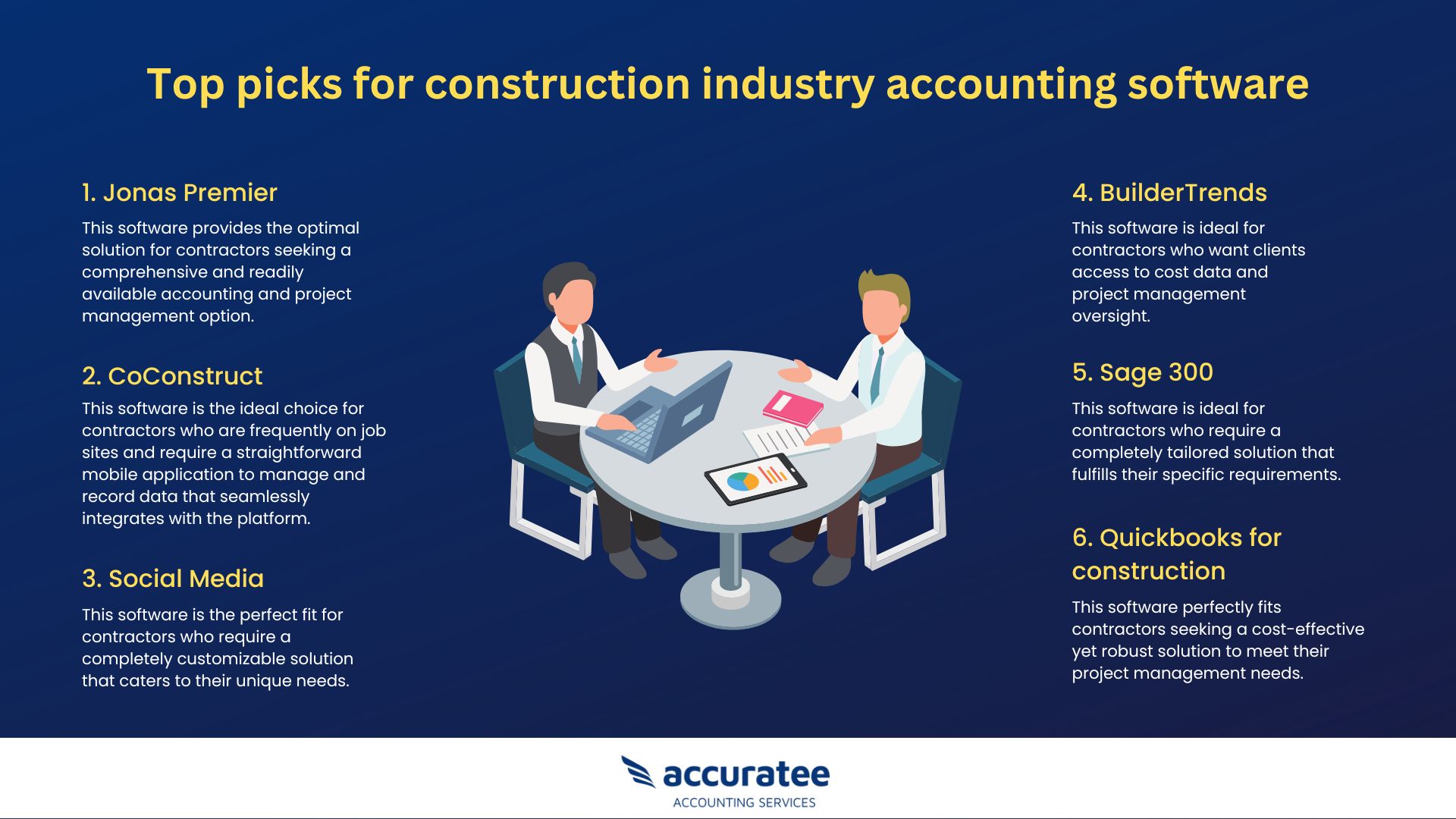Can construction accounting software automation help your business stay ahead of the competition?
Introduction:
In the construction world, competition can be fierce, and staying ahead of the game is crucial. To achieve a competitive edge over your competitors, you must effectively administer your finances, resources, and workforce.
That's where construction accounting software automation comes in! These innovative solutions can help streamline financial processes, reduce errors, and even enhance decision-making abilities.
This blog will explore how construction accounting software automation can help your business thrive and outperform your competitors. So, buckle up and get ready to discover the many benefits of this game-changing technology.
Key takeaways
Construction accounting software automation streamlines financial processes for better management and decision-making.
Automation tools reduce errors and minimize costs, leading to increased productivity and competitiveness.
Real-time data analysis and reporting allow for accurate job costing and budget management.
Document management and collaboration features enable seamless communication among project stakeholders.
Construction accounting software helps businesses stay compliant with regulations and tax laws.
What is construction accounting software?
Construction cloud accounting software is an indispensable tool for construction firms seeking to optimize their financial operations. With specialized features like project management, job costing, and invoicing capabilities, these programs provide seamless integration with other accounting and financial applications. The construction accounting software market is expanding rapidly, thanks to technological advancements, cloud computing, and digital transformation.
By adopting this software, construction firms improve their project management, streamline operations, reduce the costs and resources associated with real estate transactions, and achieve better project outcomes. Additionally, the software can provide real-time insights and analytics to help construction firms make informed decisions about their financial strategies.
With more construction firms recognizing the potential of innovative technology to enhance financial management and decision-making, the Australian market for Construction Accounting Software is poised for growth. This trend has created a favorable environment for adopting this software, positioning it as a vital tool for firms seeking to keep ahead of their competitors.
Key benefits of construction accounting software
Construction accounting software helps regulate financial-based operational tasks throughout the construction project lifecycle.
Enables real-time collaboration and communication between project stakeholders, such as contractors, subcontractors, and vendors, to streamline project workflows and minimize errors and delays.
Enhances compliance with industry regulations and tax laws by automating and tracking financial transactions, reducing the risk of mistakes, and ensuring all financial records are accurate and up-to-date.
Provides a platform for document management, allowing construction companies to store and access project-related documents and files in a centralized location. This can improve collaboration, reduce the risk of lost or misplaced documents and simplify sharing information with project stakeholders.
Facilitates integration with other software systems, such as project management or customer relationship management (CRM) software, allowing for a seamless flow of information between different parts of the business. This can improve efficiency, reduce errors, and provide a complete view of the business's operations.

Why should construction businesses use construction accounting software?
Here are some reasons why construction businesses should consider using construction accounting software:
-
Streamline invoice management
With construction accounting software, construction accounting professionals can enable businesses to generate invoices from project budget information easily. This saves time and reduces errors associated with manual invoice creation.
Additionally, some software systems allow for automated billing of customers, speeding up the payment process.
-
Improved cash flow management
By automating the process of invoicing customers, businesses can ensure they receive payments promptly. Additionally, construction accounting software can track expenses, allowing companies to stay on top of their cash flow and reduce risk.
-
Improve accuracy of job costing
Real-time data analysis enabled by construction accounting software can help businesses accurately calculate job costs. By tracking expenses and comparing them to initial estimates, companies can gain much better insights into the costs associated with each project. This information can be used to make intelligent business decisions and improve profitability.
-
Improvised budget management
Construction accounting software can provide a clear view of the budgets associated with each project. By tracking expenses and comparing them to estimates, businesses can identify potential problems early on. This helps minimize budget overruns and ensure projects stay profitable.
-
Reduce payroll processing time
With construction accounting software, businesses can simplify payroll processing. This software can track employee time and attendance, making it easier to generate accurate payroll reports. Automating these business processes can save businesses time and money in the long run.
-
Immediate bank reconciliation
Having a comprehensive view of the company's financial state is essential to staying on top of cash flow. Construction accounting software can help automate bank reconciliation, allowing businesses to analyze their finances in real-time and better allocate funds.
-
Tax filings
In addition to helping businesses organize their finances, construction accounting software can assist with tax filing. Instead of manually entering data into a spreadsheet or filing taxes, companies can use software to accurately prepare their taxes and ensure all relevant data is included. This helps reduce the stress of tax season and minimize potential errors.
-
Financial reporting process
Construction accounting software can provide businesses with financial reporting tools to track the company's income, expenses, and assets. This financial data analytics can create accurate financial statements and reports necessary for filing taxes or applying for loans. Additionally, these reports can give management an overview of the company's economic performance.
Expert Bookkeeping at Your Fingertips!
How automation is helping construction businesses outperform their rivals?
In the construction industry, staying competitive requires keeping up with the latest technological advancements. One such advancement is intelligent automation, such as construction accounting software. By leveraging construction accounting software automation, businesses in the construction industry can explore several benefits that can help excel beyond their peers.
Here are some specific ways in which construction accounting software automation can help businesses outperform their rivals:
-
Cost savings
Automating financial processes in construction businesses can result in substantial cost savings. Eliminating manual data entry processes by automating financial processes in construction businesses can result in significant cost savings, and outsourcing bookkeeping services can further reduce employee wages and benefits expenditures. By utilizing automation tools, companies can also minimize expensive mistakes like overpayments or missed payments, which ultimately saves money in the long term.
-
Increase productivity
Automation tools can help construction businesses increase productivity, as many tedious tasks can be automated. Workers can focus on more critical initiatives like project management, customer service, and forecasting by freeing up time devoted to mundane entries and calculations. This increase in productivity ultimately leads to improved business performance.
-
Better analysis
Automation allows businesses to accurately analyze their financial data in real-time, allowing them to make informed decisions quickly. This is especially beneficial for construction firms that must handle large amounts of data daily and must stay on top of cash flow and profitability. Automation also allows companies to collect data from multiple sources, including social media, customer feedback, and other business systems, allowing businesses to gain a comprehensive understanding of customer behavior, market trends, and industry best practices.
-
Increase data security
Automation also helps improve data security by offering advanced encryption and other security measures unavailable in manual processes. This can help protect sensitive information from malicious individuals and organizations, ensuring the safety of clients' financial records.
-
Improved accuracy
Automation helps ensure more accurate results by eliminating human error from the equation. By relying on software to handle complex calculations, businesses can be confident that their financial data is always accurate and up-to-date. This eliminates potential headaches caused by incorrect numbers or miscalculations.
-
Increased scalability
Automation tools make it easier for construction businesses to scale up their processes and operations. By automating the entire bookkeeping process, companies can more quickly and easily add new projects or increase their production capabilities in response to changing market conditions and customer demand.
-
Improved customer satisfaction
Automation in construction businesses can significantly improve customer satisfaction by enabling quick access and processing of financial data, leading to faster payments and ultimately providing better service. This enhanced service can foster stronger relationships with clients, resulting in higher overall satisfaction.
List of best construction accounting software available in the Australian market
Here are some of the best construction software available in the Australian market for the year 2023:

Key strategies to choose the right accounting software for your construction firm
Choosing the right software for your construction firm can be a critical decision, as it can impact your business's efficiency, accuracy, and profitability. Here are some key strategies to consider when selecting the software for your construction firm:
-
Identify your specific accounting needs
Before you start evaluating construction software options, it is crucial to determine your specific accounting requirements based on your business models. For example, you may need features like job costing, project management, payroll, inventory management, billing, or accounts payable and receivable management. Make a list of the features that are most important with respect to your business needs.
-
Research and compare accounting software options
Once you have identified your accounting needs, it is essential to research and compare different options to ensure a positive customer experience. Factors such as cost, ease of use, integration with other systems, scalability, and customer support should be considered when evaluating construction bookkeeping software.
-
Check for industry-specific features
Look for software that has industry-specific features for construction firms. For example, you may need software to handle change orders, track subcontractor payments, and manage lien waivers.
-
Evaluate cloud-based versus on-premise software
Consider whether you want cloud-based construction software or on-premise software. Cloud-based software is usually subscription-based and can be accessed from anywhere with an internet connection. On-premise software is installed on your local computer and typically requires a larger upfront investment.
-
Get a demo or trial
Before you decide, get a demo or trial of the software. This will allow you to test the software and see if it meets your needs and is easy to use.
-
Check for integration with other systems
If you use other systems such as project management, payroll, job cost, or inventory management, ensure that the software you choose can integrate with these systems.
-
Consider future business growth plan
Finally, consider your future growth plans. Choose bookkeeping software that can scale with your business model and accommodate your future needs.
By following these key strategies, you can choose the construction bookkeeping software that meets the unique needs of your construction firm and helps you manage your finances more efficiently and effectively.
Conclusion
When it comes to accounting, construction businesses need the right tools to outperform their rivals. With construction accounting software automation, those in the industry can easily manage their workflow and finances while gaining that called-for peace of mind.
CleanSlate understands construction businesses' unique financial management needs and provides specialized construction accounting services to help streamline operations and increase profitability.
By partnering with CleanSlate, firms can rely on their expertise to help navigate the complex financial landscape of the construction industry. With accurate financial data and streamlined processes, businesses can make informed decisions and focus on what they do best - building.









